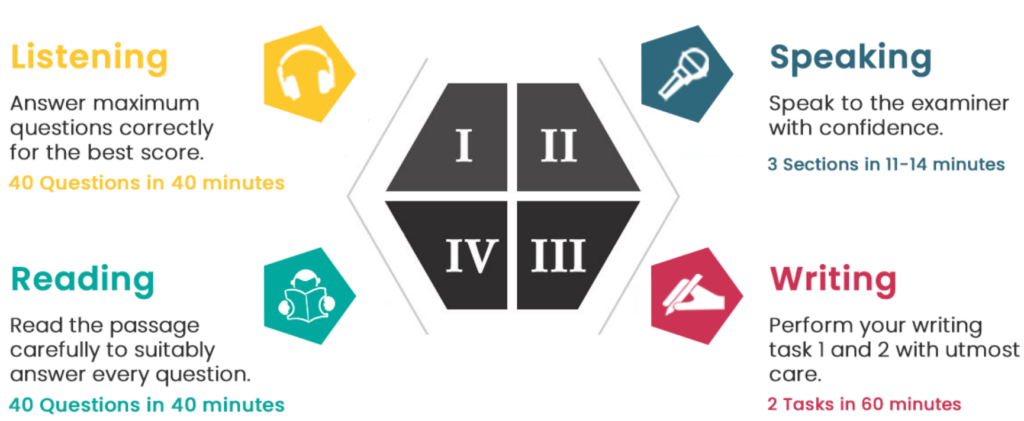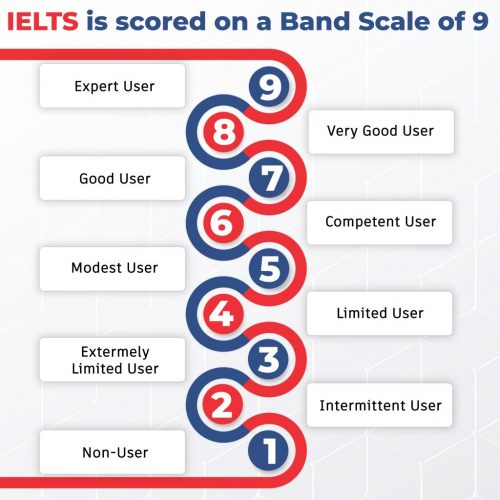IELTS Preparation
Everything You Need To Know
We'll go through the IELTS, its different versions (Academic/General Training), and the one you'll be required to take as a graduate student in this post. We'll go through the exam methodology, scoring patterns, and the benefits of a high IELTS band as well.

What is the IELTS test and how does it work?
With over three million applicants taking the test each year, the International English Language Testing System, or IELTS, is one of the most well recognised standardised English language competency assessments in the world. The exam, which is administered in collaboration with the British Council, is needed of non-native English speakers (those whose mother tongue is not English) who desire to study or work in English-speaking nations such as the United Kingdom, the United States, Canada, Australia, and New Zealand.
The ability of the candidate to communicate in English is tested in four areas: speaking, listening, reading, and writing. The applicant is given a band on a scale of 0-9 for each of the four modules based on his or her score. An average of the scores from all four components will be used to determine the overall band score. Universities that need an IELTS score make their criteria apparent on the official website, so you know precisely what you're striving for. Universities often need an average band of 6.5 or above, with no less than a 6 on each of the four modules. However, criteria may differ from one university to the next.

What are the different types of IELTS tests?
Because the IELTS is used for both schooling and immigration, it has two separate modules: IELTS (Academic) and IELTS (General).The Academic IELTS is for students who want to pursue higher education in countries where English is the first language or where English is the medium of teaching in their preferred course. As a result, the test is designed to assess your ability to absorb and comprehend academic language, and it necessitates a good knowledge of the English language. It's also aimed at professionals like physicians and nurses who wish to pursue further education in an English-speaking nation.

Those seeking non-academic training or employment in a foreign country take the IELTS General Training module. It is also used in the immigration process The General module assesses conversational abilities and the ability to communicate in English in a variety of social and professional situations.
Academic vs. General IELTS - What's the difference?
The Listening and Speaking parts of the IELTS General and Academic tests are identical. The Reading and Writing modules, therefore, are the most key differences.
What is the test format for the IELTS Academic?
The test lasts 2 hours and 45 minutes and is divided into three portions, with the Speaking section taking place separately (lasting 11-14 minutes). All four modules of the computer-based IELTS are administered on the same day for students taking the test.

Scoring Pattern
Speaking and writing are completely subjective, therefore points are assigned based on the capacity to communicate effectively and accurately, as well as the use of vocabulary, grammar, syntax, and sentence structure. As a result, a score ranging from 0 (non-user) to 9 (experienced user) is assigned. There are 40 questions in Reading and Listening, each worth one mark. You receive a single mark for each correct answer, which is then added together to give you your total raw score. For example, if 30 of your listening answers are accurate, your raw IELTS listening score will be 30 out of 40, which will be translated into bands.
In order to convert scores to bands, the raw score is matched with the corresponding band score. So if your raw score is 30, it will be converted into 7 bands. Each section has its own band score, and based on the average of the four bands, a score is given.

Now, the IELTS may appear to be a piece of cake, but the fact is that many students are taken aback by the test when they arrive at the exam site, not because their command of English is poor, but because they are unfamiliar with the test structure and scoring. Getting a good grade on the test is actually rather simple if you practise often and improve your reading and writing abilities.
We Are Progressive
Now, the IELTS may appear to be a piece of cake, but the fact is that many students are taken aback by the test when they arrive at the exam site, not because their command of English is poor, but because they are unfamiliar with the test structure and scoring. Getting a good grade on the test is actually rather simple if you practise often and improve your reading and writing abilities
Register now and one of our experts will get back to you shortly.


